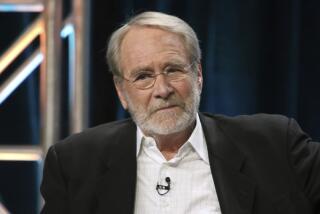Matthau: The Kindly Actor Behind the Grumpy Persona
- Share via
The strange and wondrous paradox of the star system is that we go to see stars we want to see on the screen and then pretend we don’t know them. It was Cap’n Ahab, not Gregory Peck, dying in his quest for Moby Dick, and it was Cody Jarrett about to blow sky high on top of the refinery tank in “White Heat,” not Jimmy Cagney; it was not even Frank Sinatra as the doomed soldier in “From Here to Eternity.”
But it certainly was Walter Matthau--who died Saturday at 79--we went to see, especially in the range of roles he played once he crossed that invisible line between the damned good actor whose name you couldn’t quite remember and the unforgettable actor-persona he became.
He’d been the sheriff leading the fatal pursuit of Kirk Douglas in “Lonely Are the Brave” and many other personas in his busy, early film career. Part of his skill was that you couldn’t be sure if he was a good guy or a bad guy. In Stanley Donen’s “Charade,” he was the unsuspected good guy most of the way, trying to help Audrey Hepburn, and then, pow, he was the villain, leading Cary Grant on a murderous chase down the colonnade. He’d been at it a good while when he made “Charade,” but for me, and perhaps others, that was the film in which Matthau crossed the invisible line between supporting actor to star supporting actor--on his way, of course, to star leading actor.
What makes the actor a star is one of the great debatable mysteries, although at its heart is the unvarying truth that the camera likes what it sees. The movie camera has X-ray qualities, as I’ve often said. It perceives the performer, whatever the role, as someone you’d like to know, someone you sense instinctively is, as they say, “good people”--even in a villainous role. There has to be some kind of congruence, a linkage between the actor and the role, or the roles, as there frequently was between Matthau as the cranky, crafty character he so often was.
Matthau, in my experience, was one of the kindest and least pretentious actors I knew. I once wrote a documentary about war movies, and Walter was one of the narrators involved. The night before the sequence was to be shot, he called me at home. That familiar, booming voice said, “Cholly, listen, I hope ya don’t mind, but I changed a word here and there, just to make it a little easier for the old man to say.” No complaints, no demands for a rewrite. He was a very good editor and, of course, on camera it never sounded as if he were reading cue cards; he was just Walter Matthau, talking.
He was enormously proud of his work in “I’m Not Rappaport,” as well he should have been. His role in Herb Gardner’s beautifully talkative play seemed at first glance to be another kind of role he had been playing with and without Jack Lemmon: the colorful curmudgeon whose whole presence was like a kind of disguise. But Matthau gave the character such depth, such imperfectly disguised vulnerability and, accordingly, such poignancy, that the film was funny and moving, working on the levels where absurdity and meaning mingle.
We last had lunch in 1997 to talk about “Out to Sea” or, more particularly, about his very long friendship and collaboration with Lemmon. The real pleasure of the lunch was that, unlike many oft-interviewed celebrities, he did not have a ready store of anecdotes to dine out on. If anything, he preferred to correct an anecdote or two that I’d heard. One involved what Lemmon had told me was their first meeting, at Sardi’s, when Walter was still standing gingerly because he was recovering from lacerations suffered when he sat on Gloria Vanderbilt’s glass cocktail table and it smashed to bits.
The lacerations were accurately reported, Matthau said. But the meeting was at a deli in Brentwood, when Matthau heard Lemmon order a chocolate shake and fried shrimp. “That is not a Jewish specialty,” Matthau said he advised Lemmon. Then Matthau said, “I think we should stick to Jack’s version of the meeting; it’s funnier.”
When a superb and unique actor leaves us, we can take some consolation from the performances that live on. So, Walter can be the growling curmudgeon as often as we want him to be, but this will not disguise the void in our lives.
More to Read
Only good movies
Get the Indie Focus newsletter, Mark Olsen's weekly guide to the world of cinema.
You may occasionally receive promotional content from the Los Angeles Times.










